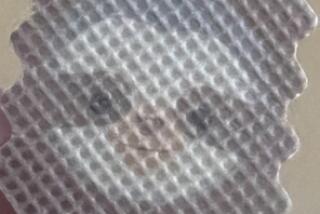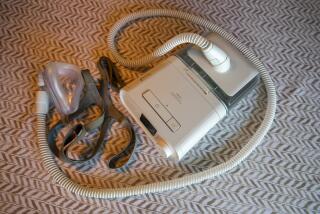FDA Probes Heart Attacks in Users of Nicotine Patch
- Share via
Federal regulators are investigating reports of heart attacks in five people who continued to smoke while they wore nicotine patches to help them break the habit.
The reports, from Sturdy Memorial Hospital in Attleboro, Mass., have triggered concerns about the safety and proper use of the patches. Available only by prescription, the patches have been widely promoted to both physicians and the public since they became available in the United States in late 1991.
People who wear the adhesive patches and continue to smoke “seem to be playing double jeopardy,” said Dr. Richard Shea, the hospital’s medical director. Shea notified the U.S. Food and Drug Administration of the cases earlier this month and also issued a media alert.
The hospital would not say which brands of patches had been used by the patients, although more than one brand was used. Shea said one of the patients had died, but that the death appeared to be unrelated to the heart attack. All of the cases have occurred since April 1.
In a telephone interview, Shea said that he was not trying to “slam” nicotine patches and that the five case reports may turn out to be a fluke occurrence. He added: “I am trying to make sure that people understand that the instructions for the use of the patch need to be observed fairly religiously, which means not smoking.”
On Friday, an FDA spokeswoman said the agency was just beginning its probe and could not say whether the patches and the heart attacks were linked.
Four brands of nicotine patches are marketed in the United States. They are Habitrol, manufactured by Ciba-Geigy Corp.; Nicoderm, manufactured by Marion Merrell Dow Inc.; Nicotrol, made by Parke-Davis, a division of Warner-Lambert Co.; and ProStep, made by Lederle Laboratories.
All of the patches contain nicotine, which enters the bloodstream through the skin. The patches, meant for hard-core smokers who have been unable to quit by other methods, are to be used along with a comprehensive smoking cessation program.
Over a period of years, nicotine and other chemicals in cigarette smoke contribute to the development of atherosclerosis, the deposition of fatty particles in arteries, including those supplying blood to the heart. A heart attack can develop when these blood vessels become blocked.
Nicotine, the addictive ingredient of cigarettes, is also a stimulant and can have immediate harmful effects on the circulation. It can cause rapid heart beat, raised blood pressure and constricted blood vessels. In addition, nicotine can increase the “stickiness” of the blood-clotting cells known as platelets, according to Dr. Jan Tillisch of the UCLA Medical Center.
Tillisch said this combination of nicotine effects makes it “possible” that there is a link between the heart attacks and the patches.
More to Read
Sign up for Essential California
The most important California stories and recommendations in your inbox every morning.
You may occasionally receive promotional content from the Los Angeles Times.












